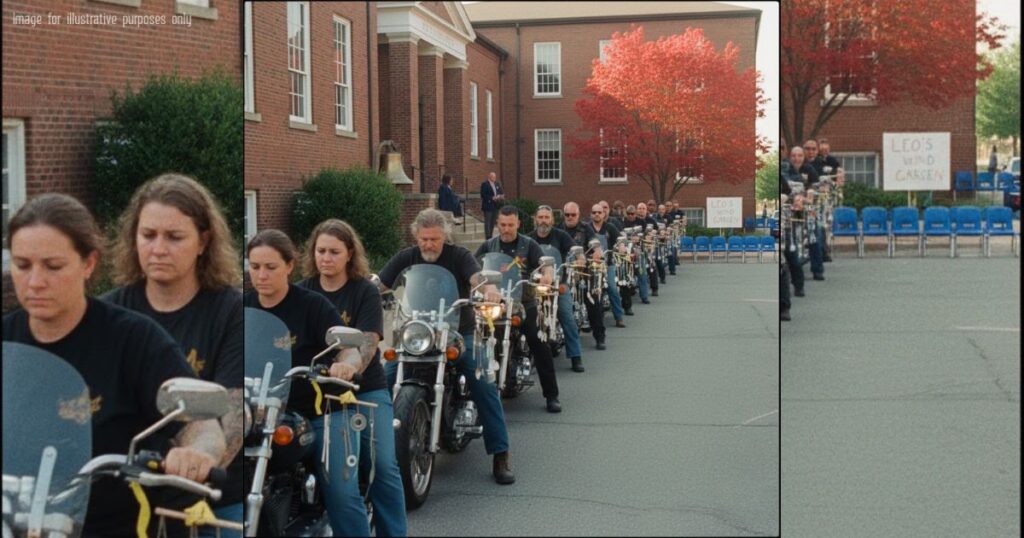They banned engines from the school at 10:00 a.m. sharp—so we taught the wind to sing.
The email hit at 6:17 a.m.: DISTRICT NOTICE—No motorcycles within five hundred feet of Riverside Elementary during the memorial assembly. No exceptions. The wording wore safety like armor—noise sensitivity, risk of alarms, potential disruption. It didn’t say Leo’s name, but I felt him in every line.
I’m Ray, forty-five. Mechanic by trade, rider by faith. On Saturdays Leo sat on my rolling stool, watching the box fan push his hair back. He didn’t chase loud. He chased motion—pinwheels, cogs, and the tiny clink of a spoon I’d hung on fishing line. Why do some washers ring higher than others, Mr. Ray? If you spin a spoon fast enough, can you make a song?
My phone lit with a text from Maya—Leo’s mom, a night-shift ICU nurse. Please, Ray. Don’t make today bigger than I can carry. The school is trying. I just need the assembly to happen. Some messages don’t ask you to be a hero; they ask you to be kind.
I wrote back: I hear you. Then I looked at Leo’s last drawing on my pegboard—motorcycles without engines and a sky of triangles tethered by string. The wind will pull them, he’d said, serious as an engineer. All we have to do is let it.
At seven I rolled the garage door open and felt a southwesterly nudge the flag awake. I called the club. Iron Compass MC met in the back booth at Dixie’s Diner. I laid the email on the table, told them about Maya and about Leo’s drawing. Then I said the plan out loud to hear if it was real.
“No engines,” I said. “Not one spark plug. We push. And we bring the music he loved.”
Grizz stared over his mug. “What music? The kid didn’t like noise.”
“Not noise,” I said. “Wind.”
By eight, the diner lot was a small factory.
We cut strips from soda cans and pie tins.
We drilled holes in old spoons and sorted washers by size and sound.
We tied everything to paracord and fishing line and, for the center of each chime, a loop of a white hospital wristband—one Maya had saved, printed with a last name and a barcode that once bossed machines around.
Sergeant Kim swung by in an unmarked cruiser before nine.
He set a folded map on the table.
“Stage along Sycamore, Elm, and Fourth,” he said. “Outside the radius, still upwind. Forecast says eight to ten out of the southwest at ten.” He didn’t smile, but his eyes did.
Back at the shop I pulled spark plugs.
If you’ve never removed the voice from a machine, it’s like taking the batteries out of a favorite toy so a baby can sleep.
The bikes looked the same—gleaming tanks, wide bars—but if you pressed the starter you got a faithful click and nothing more. It calmed me to know we couldn’t break our own rule by reflex.
At 9:15 Maya swung into my alley, hair braided, eyes that hadn’t seen a full night’s rest in months.
LEO’S TEAM in yellow letters across her sweatshirt, the ribbon color he said matched the sun. She lifted one of our chimes and traced the wristband loop with her thumb.
“What if someone misunderstands?” she asked. “What if they hear protest instead of love?”
“Then we’ll be boring,” I said. “The most careful, respectful boring they’ve ever seen. No voices raised. Not even handlebars. We’ll let the wind talk.”
She smiled, small and brave. “He would’ve loved that,” she said. “He loved when air did the work.”
We met two blocks from the school at 9:40.
Seventy-three of us—Iron Compass and sister clubs who’d answered a two-line post: For a boy who loved the wind.
Quiet only.
Bring patience.
We tied yellow ribbons to levers.
We hung chimes from mirrors and turn signals. A few older riders brought grandkids who reached for shiny things and asked if they could keep the sound.
Across the street, a handful of parents watched.
A cruiser idled and rolled away after Kim lifted two fingers in a small OK.
The redbrick school had seen science fairs and winter concerts; today it held a town trying to be careful and kind at once.
At 9:58 Principal Coleman stepped onto the front steps.
Navy blazer.
A face people call stern because it must make hard choices.
The custodian stood by the old brass bell the school uses when power flickers.
Coleman didn’t look at us. She looked at the flag, then at the courtyard where rows of small chairs waited beneath a maple that had gone completely red overnight.
We lined our bikes like bookends.
On my mirror the chime I’d made—two spoons, four washers, a strip of Dr Pepper can—trembled and then stilled. The wristband loop had Leo’s last name printed small and stubborn.
Ten o’clock.
The breeze arrived like a guest who knew how to use the door.
It came down Sycamore, crossed Elm, gathered along Fourth, and slid around the brick corner like it had studied the map.
First came whispers against chrome—lines humming, a spoon trying on a note.
Then the chimes found each other.
A soft, layered ringing rose up, not loud, not insistent—just present, like breath.
Washers kissed. Thin aluminum petals shivered. The wristbands turned and turned, gentle as a hand on a shoulder.


